It’s June 3rd, and Trump still hasn’t acknowledged Pride Month. For what it’s worth, though, that didn’t stop Ypsilanti from throwing one hell of a street party last night… It’s hard to believe that this is the same town, where, just about a dozen years ago, folks were fighting in the streets for gay rights against the likes of Tom Monaghan. I know the fight’s not over by a long shot, as the state keeps trying to roll back human rights protections, but it certainly feels like we’ve come one hell of a long way here in Ypsi. I mean, I certainly can’t imagine shutting down Washington Street for a drag show back in ’99, when I first moved back here, and before Monaghan packed up Ave Maria and fled into the Florida swamps… I know things kind of suck right now, what with Trump in the White House and all, but things felt really good in Ypsilanti last night.
update: Amy Probst just sent in this photo. If you’ve got a favorite photo that you’d like to share, send it in and I’ll either post it here, or in the comments section.
update: And this one is from Kerri Pepperman.
update: And this one is from Catherine Pappas.
update: And this one, taken at the Duane The Jet Black Eel show, is from Mike Perini.


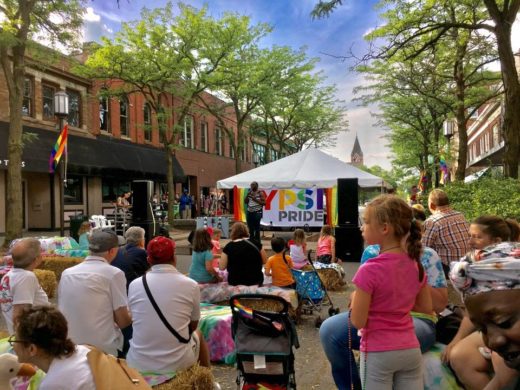
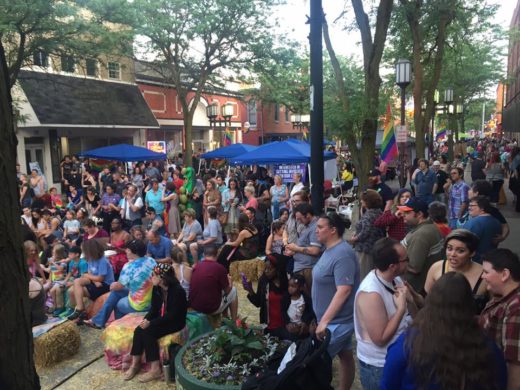
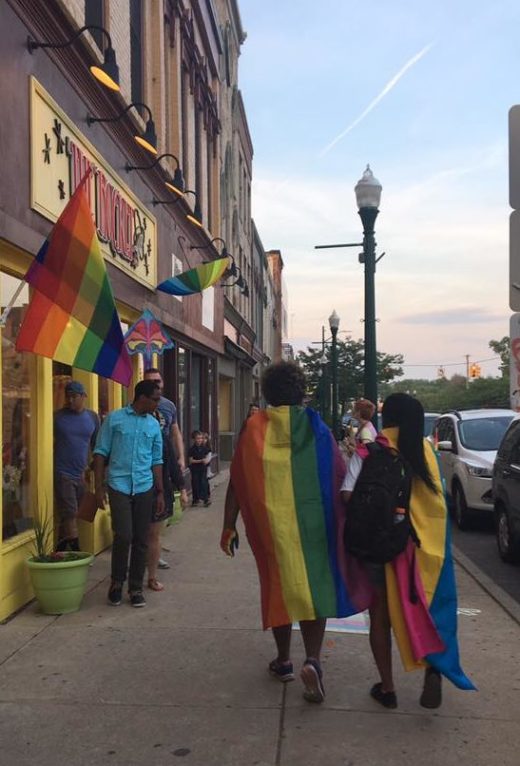
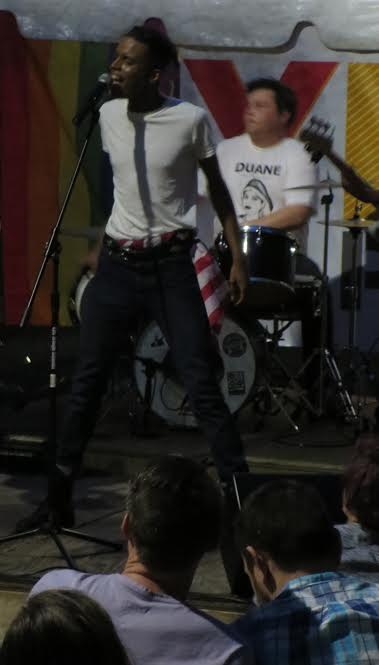







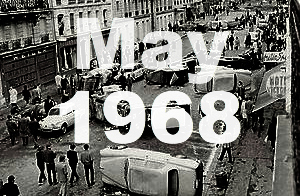



21 Comments
I ask this in all seriousness. Given that gay friendliness it typically accepted as a precursor to gentrification, which Ypsilanti seems dead set against, why instead do we quarrel over the white man frying chicken at Ma Lou’s? Isn’t what happened yesterday a more clear example?
It was so perfect that it was on Beth Bashert’s birthday. She’s worked her ass off for equality in this town. What a gift for her to be able to celebrate this from the patio of Bona Sera!
I love the pictures! Thanks. I needed some alone time last night in my backyard with the crickets and fireflies so had to miss this but I love that it looks like so many were having a really great time
What Anonymous says about gentrification is true. Richard Florida has spoken about how the role LGBQ+ friendliness in the “creative city.” Moreover a number of queer critics have also pointed out the roles that LGBTQ+ folks (especially white ones) have on gentrifying cities.
Here are a couple of relevant links:
Re: LGBTQ+ complicity in gentrification
https://www.vice.com/en_us/article/when-it-comes-to-gentrification-lgbtq-people-are-both-victim-and-perpetrator
Re: gentrification in Ypsi and complicity
https://radicalwashtenaw.org/2017/06/02/day-zine-1-hot-chicken-hot-yoga-and-hot-button-socio-political-themes/
It’s easier to point at a straight white male “appropriating black cuisine” than dig deep and explore what is really going on.
People seem to think privilege and marginalization is a straight line rather than a complex web of intersections. Most people have some forms of privilege and some experience of marginalization. Ideally, they learn to listen to look beyond their own experience and listen to and empathize with struggles they don’t share.
There is no stopping gentrification which is simply a market force. But if we don’t pay attention, those with the most capital win. ( which is actually, long term, a bad municipal and economic strategy…) Socredistance to gentrification is ideally really part of a conversation about how a community wants to direct capital. If a community is capital poor it’s pretty hard to empower anyone…
Are white lgbtq people sometimes oppressors of others? Yep. do white feminists participate in ostracization of TG people? Sometimes. Etc etc But o would argue in every case less so than the majority culture.
These hard conversations broaden us.
Gay pride parades are a correction to cultural shaming. It’s about the struggle particular to being queer. None of that denies that some LGBTQ people have great privilege and others have other forms of marginalization. The best thing about what is commonly derided as identity politics is that the groups are not fixed or singular, but broad and representative of many experiences. We just need more pride parades for more groups.
Also being anti- gentrification within capitalism is stupid. What kind of change do we want? Let’s try to avoid words that act as ideological cudgels. They mean less and less the more they are deployed. Any moment now some clever ad campaign will target American fear of gentrification (aka change) in their communities to sell us deodorant or something.
How do we include the marginalized in our growing propsoerity?
How do we help them stay here and continues to have a voice here?
These are the only relevant questions.
Heh, white artists are also a harbinger and possible cause of gentrification which is why I find it funny when artists complain about gentrification especially as so many of them that I have known over the years have profited from it. I have sympathy too though. Change is hard and it does suck if your are an artist rentor whose hard work raised property values that are someone else’s profit.
RE: “How do we include the marginalized in our growing propsoerity?
How do we help them stay here and continues to have a voice here?”
I agree that these are the two most meaningful questions re gentrification.
Generally speaking, the “marginalized” don’t think of themselves and such and don’t want or need your help.
In my experience.
Pete– They need capital. And I’m not talking about charity. Quite the opposite. This is not about increasing social benefits to compensate for systemic injustices. I’m talking about directing capital to create the kind of community one wants to live in. Do the ‘marginalized’ want to have equal access to the opportunities others enjoy? It seems to me that their own movements would indicate so And yet, still what I am suggesting is we all act in our own self-interest and work to create the kind of equitable and generative world we all want to live in.
PS The term marginalized is not used exclusively by White bleeding hearts. It may be that when people give up all hope of equity, they would no longer frame themselves (in a demographic) as marginalized. Why,then, would they bother to frame their experience in relation to majority culture, their oppressors? I’m not suggesting this is anybody’s sole identity. I think I made that clear in my first post above, but, in the context of this conversation, it is relevant. Notably, individuals who first break through societal barriers often don’t identify with the group who is held back. But movements, like the Pride, are all about collective, not individual advancement.
re: “change”
For me, including the voices of the precarious in the conversation means learning to have empathy for the ways in which we frame this discussion. I make less than 30% of the AMI for Washtenaw County. I am on Medicaid. I am in my thrities and I haven’t lived in the same spot for more than 13 months since I moved to Ypsi 5 years ago. I wish that I could stay in the same residence but it simply isn’t possible. I barely have money to do my laundry this week. Folks I know who are in a similar boat are sensitive to “change” in our community because we have been living with housing insecurity for years.
I’m not sure that saying that we are “stupid” for being anti-gentrification is the best way to include us at the table, because this is very the language that we use to describe “changes” that could have negative personal consequences for us. Including people at the table means learning to empathize with them even though they may not 100% frame things in a way that you like. Saying that we are stupid and then saying that the questions that you dictate are the “only” ones that matter is alienating, even if you are onto something in saying this.
I’d advise reading the link below:
‘Critics of gentrification get accused of vilifying business owners and being unwelcoming of outsiders, of being resistant to “change,” or of practicing selective outrage [saying that people are selective in targeting Ma Lou’s and not Pride… many of us are worried about both]’
https://radicalwashtenaw.org/2017/06/02/day-zine-1-hot-chicken-hot-yoga-and-hot-button-socio-political-themes/
I become very upset and concerned when people whose housing situations aren’t precarious (people who own their own homes) reduce our concerns to a fear of “change”:
‘It’s not so much that new businesses and amenities are undesirable in and of themselves. It’s not like having more arts, music, culture, and food options is in and of itself a bad thing. It’s that these things usually signal (and even aid in bringing about) certain negative changes down the road. It’s that these new businesses and amenities are likely to draw in folks who could displace us. It’s that all these newer businesses (babo, Ma Lou’s, Cultivate, Go! Ice Cream, etc.) and amenities (like foot bridges, place-marking signs, and grass-mowing sheep) are things that we who are vulnerable to displacement might not be around all that much longer enough to enjoy. It’s that these newer businesses and amenities might come off as being only for privileged newcomers and not particularly welcoming or accessible to those of us who’ve been struggling to get by.
Those of us who are vulnerable to displacement understand that these visible markers of what’s euphemistically referred to as “change” are symptoms of forces and processes that are much bigger than the actions of individuals or groups of individuals. Yet we also know that when we see new businesses open, we see the advancement of forces that threaten our already precarious housing stability.’
‘Simply put, it’s easy to be for “change” when you have something to gain from that change. It’s a little less easy when that change looks like it’s going to upend one’s already precarious life and community.’
It’s trivializing to reduce our concerns to fear of change and to say we are “stupid” for giving name to the changes we see. Frankly, it feels like gaslighting. I encourage empathy. When your life is precarious, “change” can often mean losing what is already tenuous. When you are a victim of systemic trauma and are under-resourced, perhaps you do become rigid and inflexible to change. You can’t just demand flexibility from people whose circumstances are already constrained. It’s easier for well-resourced people to be open to “change.” These aren’t just differences in ideology. They aren’t just differences in intellectual reasoning. These are differences in relative vulnerability.
Poor people are never going to frame things in ways that are totally acceptable to people with more resources and capital. If you don’t like how we frame things, I’d advise that you try to listen beyond the things we say that you deem to be problematic and try to understand the underlying concerns and fears. If you want us to sit at the table of people with capital, understand that we aren’t going to necessarily speak your language, nor intuitively know which ways of speaking are gonna resonate with you. We’ll try to find better ways of framing things so that you can hear what we are saying. We’ll try to listen to the advise you give. But at the end of the day we aren’t you and are naturally going to frame things in a way that reflects our experience.
‘It’s not up to you to author the terms of struggle for a poor and working class neighborhood of color that is currently under housing siege. You are not exempt from reckoning with the racial and economic disparities at hand — especially you, who own homes or multiple properties, or who run art studios, work at universities, and have considerable cultural and institutional capital.
Gaines’s letter engages in a deeply troubling mystification of gentrification, a process he describes as one that, “hardly anyone understands.” What we have here is an epistemological conflict. Gaines and his peers’ notions of information and politics are being confronted by the knowledge and experience of Boyle Heights residents. People whose rent increased 300% understand gentrification. People who are called “nightmare tenants” understand gentrification. People who have been harassed and evicted by landlords, the police, and ICE understand gentrification. Gentrification is a well-studied, well-documented, and predictable process. Gentrification in its current form has been tearing up communities from New York City to New Orleans, from Detroit to Los Angeles.’
https://hyperallergic.com/382283/a-boyle-heights-alliance-challenges-charles-gaines-and-other-artists-for-ignoring-local-voices/
I will just say that as a homeowner who bought a house in 2000 that has appreciated in value around 10% since that time, I don’t think gentrification is as big of a problem in Ypsilanti as many think. (by contrast, the same money in an index fund would have increased 100%)
So, while I can appreciate the concerns of renters, they are in opposition to the concerns of homeowners for whom their house is usually their biggest investment. To be honest, I sometimes wonder if I should support things which I know will lower the value of my house but which I think will be good for the city (i.e. building residential units on the Water Street land) but usually go with what will be good for the city because while my house is an investment, it is also where I live.
I don’t think you can compare buying a primary residence with buying stocks, especially with regards to change in value over time, without mentioning whether you borrowed money to buy one or the other. Houses are usually purchased with a mortgage, which allows leverage, while stocks are usually purchased outright. It’s very well possible that your 10% gain in housing value was made on an initial payment of 5%, for a gain of 200%, as compared to 100% gain on an index fund. Also, having to put down $10,000 on a $100,000 house is a lot different than plunking down $100,000 on an index fund. The first could be achievable for a lot more people than the second.
“So, while I can appreciate the concerns of renters, they are in opposition to the concerns of homeowners for whom their house is usually their biggest investment. ”
well this is no great surprise. CEOS and their employees are equally opposed. the concerns of renters are various but it goes without saying that many renters would love to own a home but don’t have the money, can’t get a mortgage, etc. i know a few people in that situation right now and they’re really suffering. issues of capital/wealth are at play as always. consider yourself lucky?
I admit that it is complicated once you get down the nitty gritty but once you put things like the mortgage interest deduction and the appreciation of the house on the one side and then put the maintenance and other expenses on the other, my Ypsilanti house has not been a good investment. It has been a lovely place to live though.
kjc, I do consider myself lucky to have been in a financial position to buy a house. Unlucky because I bought in an area where house prices have been pretty static but whatevs. That is the risk you take when you buy a house. Still, when talking about gentrification, it is important to realize that the needs and concerns of those who have real estate investments in a community can be in opposition to the needs and concerns of those who don’t.
It is also why often encouraging investment can be an answer. What can the city do to encourage renters to buy houses?
Because honestly, if I were a renter and I wanted to keep rents low, I might start doing whatever I could to make the schools sucky and raise crime rates while discouraging artists and gay people from moving in. I would demand that more housing be built too. I would harass certain businesses which are attractive to people with money.
It’s one thing to encourage renters that could afford to, to otherwise own a residence as opposed to leasing one, but it’s a completely different thing to ask renters who have no capital whatsoever to “invest” in housing. The thing that comes to mind immediately is Ivanka’s child care plan based on income tax deductions. It gives the most absolute benefit to those whe relatively would benefit the least.
Right. But like it or not, homeowners have incentives to support policies which increase the value of their homes. Since many homeowners live in their homes, they also have an incentive to support things which make Ypsilanti a nice place to live even if they have a negative effect on home values and there is where hope lies. That brings us back to Jean’s questions.
“How do we include the marginalized in our growing propsoerity?
How do we help them stay here and continues to have a voice here?”
Assuming, of course that property values keep rising. They may not.
Saying resisting gentrification is stupid is not the same as calling you stupid, npr. I should have said futile. If there is increasing housing demand in an area– brought on in part yea by increasingly attractive amenities (not just businesses, but free events, libraries, better schools) then the only way to prevent rising housing costs and maintain diversity is to build and subsidize more housing. Being anti- business may seem like the answer but it’s not. Within any economic system ( in communism businesses are state owned) being anti- business relegates the entire society to economic impoverishment.
I get what angers you and your frustrations. I think you have the capacity to think about this issue in ways that are more complex and likely to work. That’s not condescending. I also see and acknowledge your frustration and anger with your circumstance– which is what you are really expressing v solutions. That’s clear from my posts. You chose to see it as condescending. That’s on you.
Political discourse is about finding solutions to complex problems.Disagreement on solutions is not condescension; it’s engagement in an issue that we agree matters. If I did not engGe and disagree, but kept my views quiet, THAT is condescescion.
Disagreement with you is not belittlement.
If you want to try to change the economic system entirely, go for it. But none of that will help you or those in your situation out of your struggle any time soon. Meanwhile you will need work and housing. We all stare one concern: ‘how to improve those conditions?’ That is what we are talking about.
Build housing Ypsi. Lots. At all price points. Fund subsiduzed housing with revenue from higher end new housing and businesses. The realities of supply and demand is not going away any time soon.
Zoning for more density can be a way to lower rents while simultaneously allowing property values to go up. e.g. if demand were to increase and if the city were to allow it, people with large houses could divide them up into apartments or people with large lots could build additional structures for rent. And afaik, zoning changes don’t cost a lot, if anything.